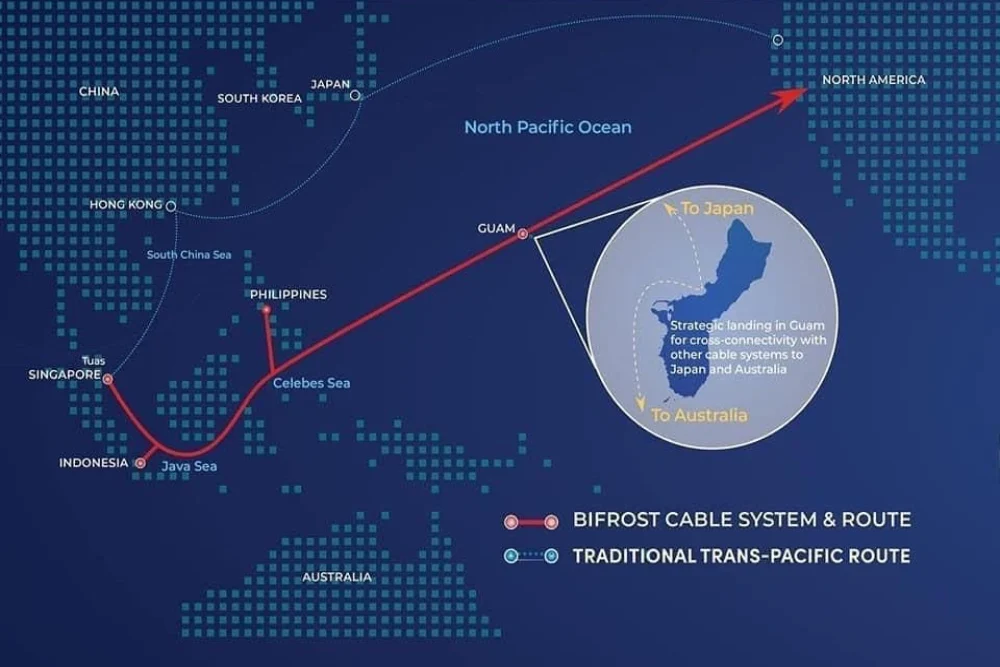As Indonesia navigates the complexities of the digital age, one issue stands at the intersection of technology, geopolitics, and national interest: data sovereignty. A recent development has brought this topic back into sharp focus—the proposed construction of a new subsea communications cable (SKKL) by tech giants Google and Meta. While the project promises to enhance regional internet connectivity and digital infrastructure, it has also sparked debate over the country’s control over its own data.
The proposed SKKL is part of a broader push by global technology companies to expand their infrastructure in Southeast Asia. However, for Indonesia, these ambitions must be weighed against national interests—especially when it comes to where data is stored, how it is accessed, and who governs it.
Why Data Sovereignty Matters in the Digital Era
Data sovereignty refers to the concept that data is subject to the laws and governance structures of the country in which it is collected or stored. For Indonesia, this has become a critical issue as global cloud providers and digital service companies continue to expand their presence in the country.
Government officials have expressed growing concern that much of Indonesia’s data, including sensitive public and private information, may end up being routed or stored abroad. This becomes especially problematic in scenarios involving law enforcement access, national security, or consumer protection.
In 2022, Indonesia introduced the Personal Data Protection (PDP) Law, signaling its intention to take control over how personal and strategic data is handled. Yet, the construction of new subsea cables by foreign entities could potentially bypass local data routing requirements. This is why projects like the Google-Meta SKKL are being watched closely.
One Indonesian official noted that while infrastructure expansion is welcomed, it should not come at the expense of national interests. “Indonesia must maintain control over data flows within its borders,” he stated. “Without that, true digital sovereignty cannot be achieved.”
The Google-Meta Subsea Cable and Its Implications
Google and Meta, two of the world’s most influential digital companies, are reportedly preparing a new subsea cable to improve internet speed and reliability across Southeast Asia. The cable is expected to connect multiple countries in the region, enhancing connectivity for millions of users and supporting the booming digital economy.
While the infrastructure is technically beneficial, critics warn that it may give foreign corporations too much control over how Indonesian data is transmitted. Unlike traditional terrestrial infrastructure—like local data centers or domestic fiber networks—subsea cables are harder to regulate. Their routes often cross multiple jurisdictions, making it difficult to enforce local laws on data use and security.
As the plan progresses, stakeholders in Indonesia are urging for clearer agreements that ensure data sovereignty is preserved. This could include requirements for local data routing, local storage, and shared governance over cable landing stations. Without such provisions, experts argue that Indonesia risks becoming merely a data transit zone, with limited influence over how its citizens’ data is handled.
Government Push for Digital Independence
Indonesia has made no secret of its desire to achieve digital sovereignty, of which data sovereignty is a core component. This includes efforts to build national data centers, encourage domestic cloud service providers, and reduce dependency on foreign tech platforms.
The Ministry of Communication and Information (Kominfo) has repeatedly emphasized the importance of local data management. Its 2023 strategic roadmap highlighted that “Indonesia must become a sovereign digital nation, with infrastructure that aligns with national security and economic goals.”
Recent collaborations with domestic telcos and the construction of sovereign cloud platforms are part of this vision. Officials argue that by maintaining control over digital infrastructure, Indonesia can better protect its data, foster local innovation, and ensure compliance with local regulations.
The proposed SKKL by Google and Meta is now seen as a test case for how well Indonesia can enforce its data protection priorities while balancing international cooperation.
Industry Response and the Road Ahead
In response to the concerns, representatives from the private sector, including local tech companies and data center operators, have voiced support for stronger data sovereignty policies. Many believe that requiring foreign companies to collaborate with local entities will not only ensure compliance but also strengthen the domestic tech ecosystem.
However, others caution that overly strict regulations could deter foreign investment. Indonesia is currently competing with neighboring countries like Vietnam, Thailand, and Malaysia for digital infrastructure investments. Being perceived as too restrictive could push investors elsewhere.
To address this, experts propose a balanced regulatory framework—one that allows innovation while protecting national interests. This could involve public-private partnerships, joint ventures, and regular oversight mechanisms to ensure shared accountability.
As the global debate over data sovereignty continues, Indonesia’s approach will likely serve as a model for other emerging economies facing similar challenges.
Navigating the Fine Line
The data sovereignty debate surrounding the new Google-Meta subsea cable highlights the growing tension between global tech ambitions and national regulatory priorities. For Indonesia, the challenge lies in finding a middle ground—one that welcomes technological advancement but does not compromise control over its own digital resources.
With strategic planning, inclusive dialogue, and clear policy direction, Indonesia can turn this moment of tension into an opportunity to reinforce its position as a digitally sovereign nation. As infrastructure continues to evolve, so too must the laws and governance that protect the data flowing through it.
Read More






 Saturday, 31-01-26
Saturday, 31-01-26







